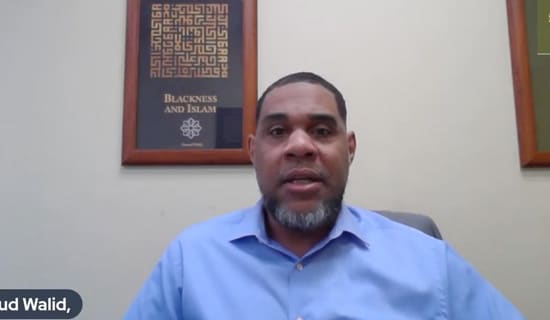During Edward S. Walker Jr.'s recent visit to the Middle East, he addressed U.S. policy regarding relations with Egypt, Israel, the peace process, and Arafat's approach to terrorism.
U.S.-Egypt Relations
Walker, who has strongly defended the importance of American-Egyptian relations, addressed the American press's criticism of the Egyptian press and of the policy of the Egyptian regime. He attempted to explain to Egyptian journalists how the political reality in the U.S. gives rise to criticism of Egypt, and to advise them how they could act to avoid such criticism.
Walker agreed with his interlocutors that the American media highlight negative responses in the Arab world and downplay coverage of Arab expressions of support for the U.S. He stated that this is so for two reasons: One is that the American public is out for blood, and the other is that the media is used by both doves and hawks in their struggle to reach President Bush's ears. "Part of the American media's policy stems from the fact that the American people are enraged in the wake of the catastrophe of September 11, and most of the media work for their public. Above all else, they serve the public. Positions of this kind [i.e. like Mubarak's] are a calming media message that could be broadcast, but they are unpopular… The people want to see someone [on the Arab side] bleed, like the 5,000 Americans who were killed and the 30 or 40,000 family members who feel loss and pain, and the children who lost their parents. The people want revenge and do not want to see what is happening in Palestine, where people are being killed in the streets. What the media does is make people feel rage and pressure, and begin to scream for revenge. This is a natural human reaction. Although this reaction need not take over our policy, it controls our media and our press…"
"Following the disaster, we heard a number of sheikhs and imams saying that Osama bin Laden did the right thing. Yet we did not hear the statements by Sheikh Al-Azhar, the mufti of Jerusalem, or the Muslim clerics from Saudi Arabia. We did not hear positive statements…"[1]
Walker also stated that the hawks in Washington are sabotaging U.S. relations with the Arab world in order to push President Bush into attacking Iraq: "Their goal is contemptible. They want to foment a crisis in the relations between the two countries at this point in time, because this would eliminate the policy of the American secretary of state for the establishment of a coalition, and would give them the right to go to the American president and tell him that this policy will not succeed and we must attack Iraq."
Walker was asked, "In recent days, some circles in Washington have attacked Egypt. Why are they resorting to this right now? Is this one way of applying pressure? Are these American circles already failing to distinguish between countries friendly to the U.S. and countries that are unfriendly?"
Walker's reply revealed the machinations of the hawks in Washington: "The real reason is that we are in the middle of a game, in which several elements in the U.S. and in the American government are raising questions about the policy led by Powell… The American president is not willing to use military force to attack Iraq, Syria, or any other country, but if the secretary of state can't resolve this situation, the coalition will fail; the American people will continue to be angry, and there will still be a reasonable likelihood that the president will turn more and more to military force. The best way to demonstrate the failure of Powell's policy is to invent stories in order to prove that our allies in the Middle East, Egypt, and Saudi Arabia are not cooperating with us."[2]
U.S.-Israel Relations
Walker's position on U.S.-Israel relations pleased his audiences. "Sharon started a confrontation with the American president, and he has been doing this for some time now. It began with his accusing President Bush of appeasing the Palestinians in order to earn support for the coalition." He added, "The animosity we are witnessing today between Sharon and the president is inevitable, because the policies of both parties are going in different directions. Sharon is trying to promote a policy of avoiding negotiations, [claiming] that [the Palestinians] do not want peace based on what the world considers to be reasonable and acceptable, while President Bush wants to create conditions that will make peace possible… I think that they are on a collision course… the policies of both sides are going in opposite directions… We are not looking for confrontation with Israel, but if such confrontation comes, it comes…"[3]
Arafat and the Struggle to Prevent Terrorist Attacks
Walker deviated from the American government line on the question of Yasser Arafat's approach to terrorism against Israel: "Arafat is in a very tough situation. Many are demanding that he act, but they don't help him to do that. It is difficult to demand that he stop the terrorists when the Palestinian police forces cannot move [freely] in the area because of the restrictions put in place by Israel, they are limited and it is difficult for them to act effectively as a state. This is the logical reason preventing Arafat from solving many of the problems. But on the other hand, I think that he is capable of solving the problems if he were to be given a little help. He can change many things. But there is another problem [regarding Arafat], and that is the criticism from the Palestinians… regarding the way he runs the state."[4]
The Peace Process
Walker ran into a dead end when the discussion reached the essential issues of the Israeli-Palestinian peace process: "Some Palestinians want to act in a different way [than Arafat] for a solution. They support an approach that will eventually lead to the establishment of two states: [a] Palestinian [state] and [another] Palestinian [state]. After the refugees return, they will take over the other lands, which make up Israel – which will [also] become a Palestinian state. We cannot agree to this. This is not the way to a solution. We can find similar proposals on the Israeli side – that is, to establish two states: Israel and Israel. This is what Sharon wants…"[5]
Put another way, Walker supports former president Bill Clinton's proposal, which was rejected by the Palestinians, with Mubarak's backing, at Camp David in July 2000
SUPPORT OUR WORK

Having no new political vision to offer his interlocutors, Walker made the establishment of a Palestinian state contingent upon the nature of its government. In his view, the Palestinian leadership and the Palestinian people must decide whether they want a democratic state. If they do, it will be easier for Israel to agree to its establishment. But if they want a theocratic state, Israel, the U.S., and even Walker himself will not be party to its establishment:
"If most of the Palestinians want it, the Palestinian state should have a democratic government, separation of authorities, and rule of law. Such a state would not constitute a threat to anyone, and this would make it easier for the Israeli people to accept. In contrast, if you are talking about a theocratic state that might fall into the hands of fundamentalists and become a springboard for unceasing attacks on Israel's right to exist – like the Hamas movement wants – then it will be difficult to find support for this state in Europe or the U.S. For this reason, it is not only a question of borders, but also of content. However, during my talks with various Palestinian elements, I found that they want a democratic state."[6]
"When I take into account the support [in the Arab world] for fundamentalist organizations and Osama bin Laden, I am convinced that we as a country [the U.S.] will not be thrilled to see [another] such state, that is, a fundamentalist state. We do not want to see another Taliban in the heart of the Middle East. For this reason, I maintain that as long as there is a lack of clarity [regarding] where this state is going, there will be no enthusiasm for issuing a blank check. Of course, this is a domestic Palestinian matter, and no one [from the outside] has the right to interfere; on the other hand, most of the Palestinians aspire to a democratic, humane state…"[7]
"The problem is that we do not know for sure what exactly the Palestinians want. Some Palestinians are demanding a state different from that demanded by others. The picture is confusing. I have not seen from Arafat a definite view regarding the form the Palestinian state will take. Will this be a democratic state? Will there be rule of law in it? What we see now from the Palestinian Authority is hardly encouraging."[8]
Walker's view that a discussion of the democratic nature of the future Palestinian state must precede a discussion of its actual establishment is reminiscent of the position of former Israeli prime minister Binyamin Netanyahu, who demands democratization throughout the Arab world, including among the Palestinians, before the signing of peace agreements and the Israeli withdrawal. So Walker's Arab interlocutors were startled; in all three of the interviews discussed here, they asked why there was a need for a public discussion of the government of a state before a discussion of its borders.
Walker said, "It's true, they [the Palestinians] talk a lot about borders, but it is not borders that define a state. The U.S. itself began to [exist] in [only] 13 communities, but it had principles to which it clung. What changes is not the fundamental nature of the state, but its borders. The nature of the state is based on democracy, human rights, equal opportunity, and other matters."[9]
"I know that the Palestinians want the settlements dismantled, and they want 1967 borders. I know all this. But the problem is that they have never spoken of the nature of the state: Will it be democratic? What is their position regarding freedom of expression, freedom of the press, equality before the law? Will there be a powerful judicial authority? The picture regarding all these issues is unclear… If a person has no clear outlook regarding the nature of the state that he seeks to establish, then the State of Palestine does not interest me, because we, in all honesty, do not want to create a terrorist or extremist state in the heart of the Middle East. I, of course, hope that this won't happen. For this reason, it is vitally important to define the outlook. The state must gain the support of the international community, and must be acceptable to Israel itself; if the Israelis think that Arafat is creating a regime similar to the Taliban's, they will never agree to the establishment of this state and we too will refuse. Thus, it is Arafat's responsibility to present to his people what is going through his mind…"
"This is Arafat's job, not ours. We cannot define what the Palestinians want for their future. The thing is that we can either support this future or not. That is already another matter. But if in Arafat's view the reins of government will be handed over to people like Hamas, we will not support it. Yet if he prevents this and puts something positive on the negotiating table, that's something else entirely. But so far we have not seen this positive thing on the part of Arafat."[10]
*Yotam Feldner is MEMRI's Director of Media Analysis
[1] Roz Al-Youssuf (Egypt), October 27, 2001.
[2] Ibid.
[3] Ibid.
[4] Al-Mussawar (Egypt), November 2, 2001.
[5] Roz Al-Youssuf (Egypt), October 27 2001.
[6] Al-Ayyam (Palestinian Authority), November 3, 2001.
[7] Ibid.
[8] Al-Mussawar (Egypt), November 2, 2001.
[9] Al-Ayyam (Palestinian Authority), November 3, 2001.
[10] Al-Mussawar (Egypt), November 2, 2001




